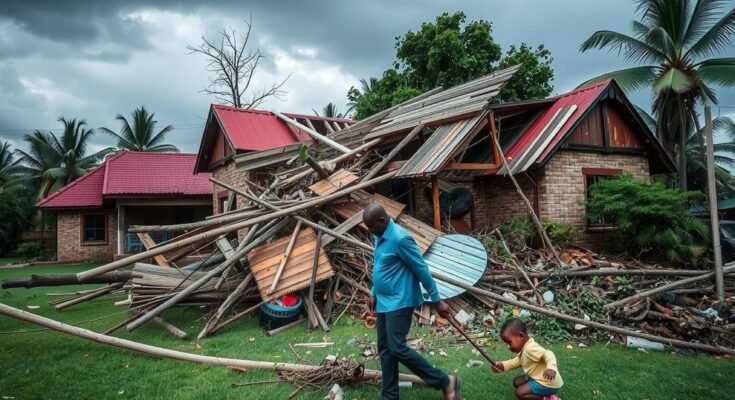Storm Chido has resulted in at least seven fatalities in Malawi, impacting over 30,000 individuals. The storm caused extensive damage to infrastructure, including schools and health facilities, particularly in several districts. Following the storm, relief efforts are underway as the government has resumed classes that were temporarily suspended for safety.
Tropical Storm Chido has wreaked havoc in Malawi, claiming the lives of at least seven individuals while impacting over 30,000 others, as reported by disaster management officials. Preliminary assessments from Malawi’s Department of Disaster Management Affairs revealed that the storm resulted in substantial damage to infrastructure, including schools and health facilities. Various regions, especially Salima, Kasungu, Machinga, Blantyre, and Lilongwe districts, reported fatalities and injuries due to the storm’s ferocity.
The storm, initially formed northeast of Madagascar, made landfall near Nacala, Mozambique, where it inflicted considerable destruction. The U.N. Office for the Coordination of Humanitarian Affairs indicated that over 174,000 individuals were affected in Mozambique, alongside 64,000 in the Comoros archipelago. Chido’s remnants continued their path through Malawi on Monday, causing heavy rains and subsequent flooding in approximately 17 districts, predominantly in the southern regions of the country.
Lucy Mtilatila, the Director of the Malawi Department of Climate Change and Meteorological Services, announced, “Our eyes are on the Indian Ocean in case there will be another development…and so far, so good.” Following the storm’s withdrawal, classes resumed in schools previously suspended for safety measures. Officials from the disaster agency have retracted search and rescue teams from affected areas and are focusing on coordinating relief efforts with humanitarian partners to aid the impacted households.
The recent impact of Tropical Storm Chido on Malawi highlights the vulnerability of the region to extreme weather phenomena, particularly those originating from the Indian Ocean. The storm’s trajectory from Madagascar to Mozambique illustrates the interconnectedness of climate events. With the U.N. reporting significant damage across affected countries, particularly Mozambique and the Comoros, the situation underscores the urgent need for robust disaster management and weather monitoring systems, as well as community resilience initiatives to better prepare for such occurrences in the future.
In conclusion, Tropical Storm Chido’s tragic consequences in Malawi, including seven fatalities and significant infrastructural damage, alongside its broader impact across the region, highlight the urgency of enhancing disaster preparedness and response strategies. The government’s swift action in resuming classes and coordinating relief efforts reflects a commitment to restoring stability in affected communities. Continuous monitoring, especially of potential tropical developments in the Indian Ocean, remains essential to mitigate future risks.
Original Source: www.voanews.com




